Three years after the commencement of the Basic Healthcare Provision Fund (BHCPF) in Kano state, a Daily News24 investigation has shown that certain rural communities in Wudil, Tofa, Gwarzo, Warawa and Kano Municipal Local Government areas of the state are yet to fully benefit from the fund.
The pain of having to spend most of their earnings on drugs from patent medicine stores otherwise known as chemists is one which has agitated the minds of Amina Yunusa and Rakiya Abba.
It is a hopeless situation for them—after toiling hard to get their meagre earnings, which is well below the national minimum wage, they spend it in chemists at a time when inflation is rising and the naira is crashing relentlessly against the dollar.
Amina and Rakiya are residents of Gwarzo Ward in Gwarzo Local Government Area (LGA) of Kano State. Yar Kasuwa Primary Health Clinic is the only primary healthcare Centre (PHC) in the ward.
“If this hospital was working, we would be able to get drugs here for free or at a subsidized rate but all the chemists in this area are making good money from our insufficient earnings. It pains us whenever we have to visit chemists to buy drugs. They are expensive but what other option do we have?” Amina laments gloomily.
The dysfunctional system of the PHC leaves it incapable of meeting the healthcare needs of the vulnerable and deprived people in the locality. Understaffed and ill-equipped, the facility can be likened to dead wood and has forced Gwarzo residents to pay through their nose to access healthcare from chemists.
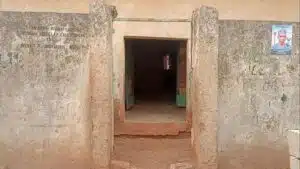
The women recalled a programme the facility was a beneficiary of which ended years ago. Then, it was easy for them to access primary healthcare: they got medicines either at a subsidized rate in the PHC, or free of charge or on credit.
“Since that programme ended many years ago, we have turned to chemists. Look around, as you can see, there are many chemists,” Rakiya says.
“Sometimes after getting a prescription from this PHC and I can’t afford the complete dosage from the chemists, I always supplement the drugs I can afford with local herbs because they are cheaper. Please if you have any assistance you can render to us in this community, we will be happy and may Almighty Allah bless you. We are tired of buying drugs from chemists, they are too expensive. Please tell the government that we are suffering.”
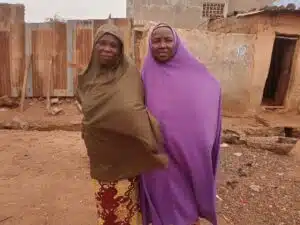
Thirteen-year-old Abdulsalam Ibrahim, who lives beside the PHC, has witnessed hooligans sneaking into the premises at odd hours to smoke narcotic substances and take drugs, as the facility has no gate.
“I see area boys almost every evening sneaking into the surroundings of the PHC to smoke and get high here. The smoke affects me and this is not good for my health,” he says.
Abdullahi Sani, the Ward Development Committee (WDC) chairman of the facility says he is completely dumbfounded as to why Yar Kasuwa PHC has been marked to benefit from the Basic Healthcare Provision Fund (BHCPF) but is not accessing those funds.
“The PHC has a lot of problems that need to be solved in terms of drugs, structure and so many other renovations so that our women in this community will stop going to the general hospital which is very far, and they can also get drugs from Yar Kasuwa PHC,” says Sani.
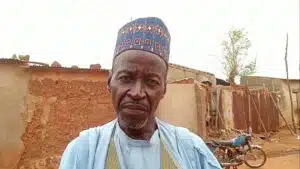
Aliyu Ya’u, the officer in charge of Yar Kasuwa PHC says the reason the facility has not been receiving funds for the implementation of the BHCPF is that a chequebook has not been issued it from the Kano State Primary Healthcare Management Board (KSPHCMB).
Yar Kasuwa health post has an account for the BHCPF, as stated by Ya’u, which has not been funded since it was opened.
But, according to data gotten from the KSPHCMB, the facility is not among the 381 facilities eligible to benefit from the BHCPF. This leaves questions as to why the PHC has an account for the BHCPF but is not officially eligible to benefit from the fund.
Like Amina Yunusa and Rakiya Abba, 84-year-old Shittu Yakubu who resides in Ungwar Gini Ward of Kano municipal shares the agony of purchasing drugs from the Ungwar Gini PHC.
Yakubu struggles to make his way back home after he borrowed N500 to purchase some drugs from the facility.
“I don’t know how I will repay the money I borrowed to buy these drugs. I have been experiencing serious headache for days now and since it has become unbearable, I had to borrow some money to get these drugs,” he says.
With no family or children, Yakubu lives at the mercy of community members. He typifies the “vulnerable population” who are supposed to be enrolled as beneficiaries of the BHCPF but because Ungwar Gini PHC hasn’t commenced the BHCPF after being marked to benefit from the Fund, Yakubu and other vulnerable people like him will keep on purchasing drugs from either the PHC or from chemists within.
“I have been buying drugs from the PHC for the past three years and I visit there or any clinic around for drugs at least every two weeks.” Yakubu says. He departs, leaving many questions unanswered because he cannot bear to continue the conversation as a result of excruciating headache.
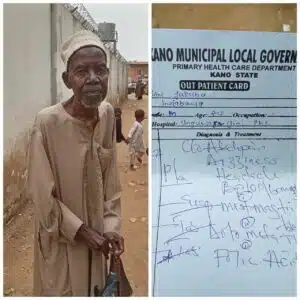
“We have not been able to access funds for the BHCPF because we are yet to get our chequebook from the KSPHCMB,” says Maryam Abdullahi, the OIC of Ungwar Gini PHC.
Facility’s neglect deprives community members’ access to healthcare
Fundamental operational flaws at the PHC in Warawa LGA create problems for the vulnerable people in the community to access the much-needed service from the facility.
When this reporter arrived at the PHC on a Thursday afternoon, he observed that the facility was left open, with not a single staff member around. What if someone was in urgent need of first-aid attention to save a life? What if someone with a malicious intent enters the PHC to cart away valuables?
Aside the fact that this facility was left open, it was stinking and littered with unused syringes. The premises is a makeshift small football pitch where boys play. The veranda serves as shed where farmers process rice. It also serves as a trade centre where young girls sell street food to farmers beside the PHC.
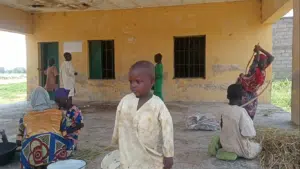
Community members confirmed that the facility does not operate regularly, and even when it does, it is neglected and left open with no one to attend to patients. This reporter waited for more than an hour in the facility to confirm what community members said – no health official showed up at the centre. In fact, the reporter entered the facility freely and checked every nook and cranny of the PHC without finding anyone inside.
Binta Abdullahi, a resident, says, “This PHC does not open always and most of us here buy drugs from the chemists in the neighborhood and if we need serious attention, we go to Wudil (another LGA) to receive care.” Wudil is 15 kilometres from Jigawa.
“It has been going on like this and if we don’t visit the chemist in this village, we have to go to Wudil,” she goes on.
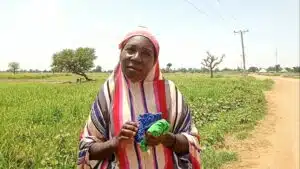
Nasiru Magaji, the OIC of the PHC insists that the facility operates daily. He maintains that even after receiving funds from the KSPHCMB for the implementation of the BHCPF, it could not access those funds because a chequebook has not been issued by the KSPHCMB to the facility to commence utilization of those funds.
“We don’t have staff in the facility because there isn’t access to the funds for over a year and because of that, we cannot hire staff to add to the work force to run the facility,” he says.
A little drop in the ocean of needs
Kofar Fada PHC in Wudil LGA is enlisted to benefit from the BHCPF. But it cannot address some health needs, because its spending is being suffocated by the KSPHCMB. The PHC received funds for 2021 when Kano State commenced the disbursement of monies for the programme. It has been able to utilize funds for the first and second quarters of 2021. Funds for the third and fourth quarters are unspent as of the time of filing this report.
Without clearance on spending by KSPHCMB since last year, coupled with the manner in which the board stage-manages spending, the PHC is constrained—and there is little it can do to address pressing needs.
This has driven community members, including certain beneficiaries of the BHCPF, to Wudil general hospital to access care.
The PHC, for instance, needs fencing and that has been indicated in Kofar Fada BHCPF plan for 2021. But the KSPHCMB has failed to give the PHC a nod to using its funds for fencing, says the WDC chairman of the facility, Balarabe Haruna.
“When we had a meeting with officials of the BHCPF, we reiterated that the problem of the PHC is fencing but nothing is done to solve our problem,” Haruna says.
“Before, we used to pay the temporary staff we employed with the funds of the BHCPF but they told us to stop using the money to pay staff and that has reduced the manpower of this facility.”
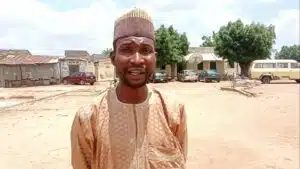
Ummi Aliyu, 25 is eight months pregnant and insists she “can never” give birth to her child in the facility.
“Take a look around this PHC. Everywhere is open, there is no form of privacy. How can I deliver my baby here?” she argues.
“Of all my children, I only gave birth to one in the General Hospital but the remaining four were delivered at home. If this hospital was fenced, I would have given birth here since it is close to my house. I only access antenatal services here.”
Sule Imamu, another resident told this reporter that the reason he cannot let his wife visit Kofar Fada PHC is the same reason Ummi Aliyu is apprehensive about the facility.
“I have observed that they have a shortage of workers in this PHC and sometimes when people are too many, some patients have to stay outside and because the facility does not have a fence, patients will sit outside and it means that passersby can just see my wife anyhow.
“Even though this PHC is just a stone’s throw away from my house, I prefer to send my wife to the General Hospital to access care because I am sure that the General Hospital has enough staff and it is secure enough. Many other men in this locality do not want their wives to receive care in this PHC because there is no privacy.”
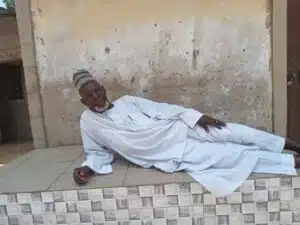
Kofar Fada PHC is not only porous but also serves as a hub for local bicycle repairers and a mini-park where passengers board vehicles to get into urban areas or other locations statewide.
The PHC’s inability to utilize its funds as a result of delayed authorization from the KSPHCMB also happens in Chedi and Alfindiki PHC in Kano Municipal LGA, Doka and Dambare PHC in Tofa LGA, Imawa PHC in Warawa LGA, amongst others.
The delay in utilizing those funds slows these PHC from actualizing the United Nations (UN) Sustainable Development Goal (SDG) 3 which seeks to ensure healthy lives and promote well-being for all at all ages.
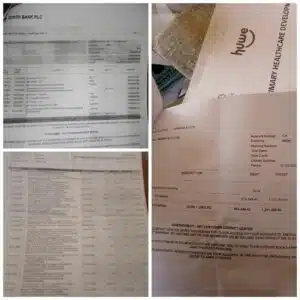
KSPHCMB react
Dr Tijjani Hussaini, the Executive Secretary of KSPHCMB says since the bank accounts were opened for the PHCs, unspecified banking challenges made it difficult for the board to get chequebooks for some PHCs for almost two years. He said the board in several follow-ups has formally written to the banks on several occasions as well as the Accountant-General of Kano State.
“We asked the banks to return the money so that we can disburse the funds for those quarters that have been paid into the accounts of those banks but the banks are yet to respond. Therefore, we had to change to another bank for the affected PHCs and as of now, the process of opening another bank account for the affected PHCs is almost concluded,” Tijjani says.
“Because we don’t deal with the PHCs directly, we do not have quick access to information that is peculiar to some PHCs.
He insists that at no time did the board tell PHCs to stop utilizing their funds.
“Yes, we placed an embargo on some facilities because we went to some LGAs and found out that what is in their BHCPF facility business plan is entirely different from what is obtainable at the facility to the extent that we discovered that an OIC could withdraw as high as N2 million naira and guidelines state that not more than N50,000 can be withdrawn within a period,” he reiterates.
He said the embargo, irrespective of its issue, was not a blanket ban on all the facilities in the state, as some others are utilizing their funds. He noted that the restriction on the recruitment of staff ordered by the board was because some irregularities were discovered in the hiring and payment process of individuals employed by the PHCs.
“It has been stopped till we screen the individuals which the PHCs intend to hire. Some PHCs could say that they have been stopped from hiring, but that restriction has been lifted months back and perhaps why some PHCs are afraid of taking those funds is because of the consequences of not properly utilizing funds that they withdraw,” Tijjani says.
He added that funds for 2022 have been released but approval has only been given for the disbursement of funds for the third quarter, pointing out that funds for other quarters can not be spent pending approval from the National Primary Healthcare Development Agency (NPHCDA).
The BHCPF is a federal and state-funded initiative which was established under section 11 of the National Health Act of 2014, as an incentive funding to enhance access to primary health care. It calls for improved investment within the health sector. It was signed into the 2019 fiscal budget by President Muhammadu Buhari in 2018 and serves as a Basic Minimum Package of Health Services (BMPHS), to increase the fiscal space for health, and strengthen the national health system, particularly in primary health care.
In 2019, the Kano State government received N949 million for the implementation of the BHCPF and in 2022 it received N1.64bn. A recent report by ONE campaign showed that Kano State performed a little above average since the commencement of the program, despite being among the states which received the largest funds for the implementation of the program in Nigeria.
Out of the 1,200 accredited PHCs in Kano State, 381 have been enrolled into the BHCPF, while the others are yet to start accessing the funds.
This report is supported by the International Budget Partnership IBP and the International Center for Investigation Reporting ICIR


